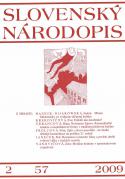Morálne hodnoty v spomienkovom rozprávaní
Moral values in memorates
Author(s): Zora VanovičováSubject(s): Anthropology
Published by: Ústav etnológie a sociálnej antropológie Slovenskej akadémie vied
Keywords: moral values; folklore; commemorative narrative; mental representations; psychoanalysis;
Summary/Abstract: Commemorative narrative as a genre relying on memory covers a very long time period, bridging the past lived by the ancestors, then reassessed, re-established, adopted or modified and passed on to next generation, with the present lived just now. The past thus revives in memories – the recollection of past events and experience handed over to another generation. The commemorative narrative has a potential to gradually process long-lasting developments, changes and shifts and so it may clarify certain attitudes held in the present. In his category of symbolic capital, P. Bourdieu identifies not only the power of explicitly stated norms but also the power of inherited, implicit, or acquired dispositions, interests and principles of behaviour. He speaks about two parallel levels of moral, ”Christian” and ”lay”. In certain communities there exists a specific dual consensus concerning behaviour which is influenced by the character of denomination, a model inherent in a family, a decisive agent in maintaining the social order. Even during the folkloristic inquiries we may encounter astonishing dilemmatic narratives in which the informants attempt to comment on or explain their attitudes and decisions. Sometimes only a longitudinal research and a deeper knowledge of the way of life of a particular community or closer personal acquaintances, perhaps also a look into concrete social or family relationships may help understand the complex and ambiguous attitudes of individuals standing in concrete situations and relations. The problem of this feature of human psychology was a target of classical psychoanalysis; now it has also appeared in the focus of cognitive anthropology. One of the issues often revealing the ambiguous character of attitudes is that of moral values. Instead of manifesting the acceptance of traditional Christian attitudes and approaches to various life situations, the repertoire of commemorative narrative encompasses many differentiated, ambiguous and even entirely contradictory accounts of personal experience, relations or positions of retained by 229 individual people. They thus inform us about the attitudes the informants may take within the same contextual framework to the gender issues, and approaches to problems at the levels of individual and public, rational and emotional, tolerated and penalised, traditional and institutional. The research sample was represented by a narrow circle of neighbours living in the same street in a small town. Among the most frequently occurring topics in their memorates there were mutual relations, extramarital relations and children born out of wedlock, adultery and its consequences.
Journal: Slovenský národopis
- Issue Year: 57/2009
- Issue No: 2
- Page Range: 220 - 229
- Page Count: 10
- Language: Slovak

